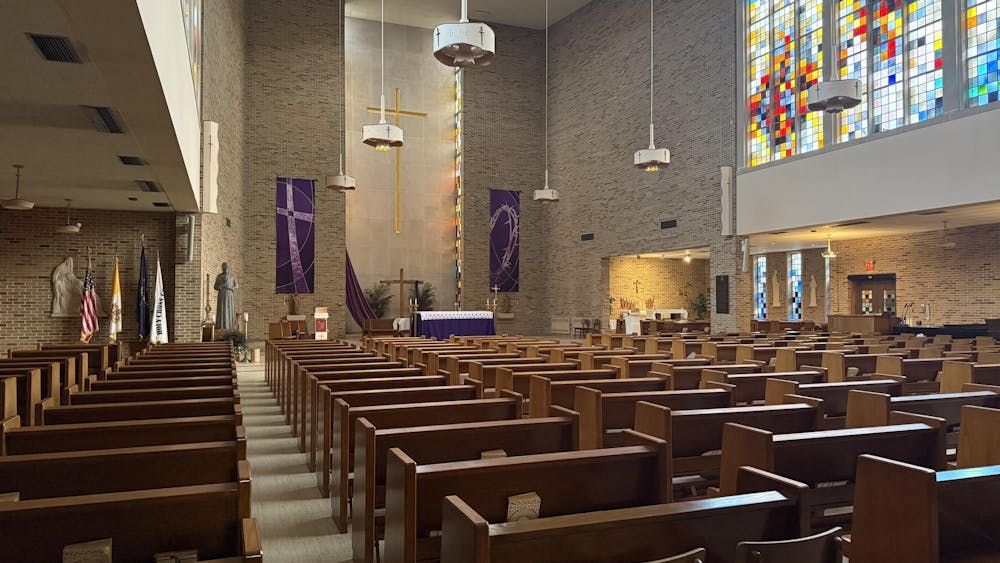Thursday evening, the Notre Dame student senate gathered to discuss student union investments, coronavirus education, support for Title IV and the petition for Fr. John Jenkins resignation.
The meeting began with an update from Student Advisory Council on campus reopening. Major changes include indoor dining, which will begin in the dining halls Monday. More locations, such as Duncan Student Center and LaFortune Student Center, will likely open for indoor dining on Nov. 1.
In addition, heating lamps will be installed in the North Quad and South Quad tents to accommodate for colder temperatures. In regard to residential life, students can now host two additional guests from their residence hall in their dorm as long as visitors wear a mask and keep doors open. Administration also hopes to open the residence halls to non-residents provided case numbers remain low.
Surveillance testing will be unavailable this weekend as the testing center moves from its current location to the North Dome-Joyce Center. Currently, the committee is working with administration to consider testing options before students return home for winter break, as well as possible educational opportunities for students during the 10-week break. Looking forward to the spring semester, administration is brainstorming ideas to help avoid student burnout, which has been especially prominent this fall in the absence of a fall break.
Next, an order to amend the constitution to prohibit student union investments in and consumption of forced labor was presented by senior Ricardo Pozas Garza with the senate voting to table the order and give the committee more time to finalize it. Since the Investment Office is a private entity, senators must cooperate with them to achieve these policy goals. The committee executives will meet with the Investment Office on Friday to present their request to gradually divest in companies profiting from unethical labor investments.
Sophomore Isabella Garcia of Badin Hall was approved as the new appointment to the Campus Life Council before a resolution to educate COVID-19 positive students returning from isolation on the continued risks and unknowns about the coronavirus. Specifically, the resolution calls for administration to provide consistent information about how the level of antibodies and immunity can vary by individual and how research on reinfection remains ongoing.
Senior off-campus president Connor Delaney, joined by senior director of university policy Abby Wolfe, spoke next advocating in support of a resolution to uphold the preponderance of evidence standard in Title IX and other sex-based misconduct cases. The University currently has two different evidence standards on record, but new national guidelines from the Department of Education require that only one standard remain in place.
The preponderance standard requires that a claim presented for review must be more likely true than not with a greater than 50% likelihood while the clear and convincing standard holds that a claim presented for review must be highly and substantially more likely to be true. Citing already low rates of reporting among Notre Dame students, members of the committee endorsed the preponderance standard as the best option. Given the limited use of the clear and convincing standard, zero cases in the last five years, and the worry that more stringent standards may lead to a decrease in reporting, the committee strongly favored the preponderance standard.
“It’s the only standard that treats complainant and defendant equally,” Delaney said.
The senate seconded the committee’s position, voting to approve the resolution in favor of the preponderance standard.
To wrap up the evening, the senate opened the petition for Father Jenkins’ resignation for discussion. Since the petition garnered 213 signatures, the judiciary council was obligated to formally sponsor a proposal for Jenkins’s resignation.
Juniors Ashton Weber, Makira Walton and Patrick Kelly-Dutile, the authors of the petition, made the case for Jenkins’ resignation, pointing to his violation of coronavirus guidelines in attendance at the nomination ceremony for Justice Amy Coney Barrett on September 26. The petition-writers said Jenkins’ hypocrisy, poor leadership and uninspiring apology were grounds for passing this proposal.
“He cast a negative light on the University as a whole,” Kelly-Dutile said.
Supporters also noted how the Dean of the Law School chose to follow guidelines, further proving Jenkins’s conscious choice to break protocols. They noted some students who broke COVID-19 guidelines were dismissed from the University while the president broke guidelines with no consequences.
Many senators spoke up against the proposal on the grounds that only 2.5% of the student population signed the petition. Additionally, they emphasized how the proposal was very extreme and would only be a recommendation on behalf of the student body with no binding power. A few senators supported less extreme measures to make student voices heard, such as an official statement of senatorial disapproval of Jenkins’ actions.
“Passing this resolution will only hurt you in the eyes of the administration,” junior Thomas Davis, the parliamentarian, said. “The precedent you’re setting by passing this may shut [the senate] off from any further dialogue going forward.”
On the other side of the debate, the proposal’s supporters argued that extreme measures are needed to call proper attention to the situation.
“Something this actionable has never been done before,” the petition writers said. “That is going to open up more dialogue and discourse than a petition advocating for dialogue and discourse.”
With these considerations in mind, the majority voted against the resolution with further discussion on formerly condemning the president’s actions and opening up dialogue on the situation slated for next week’s meeting.
Senate discusses student union investment in forced labor, rejects proposal on petition for Jenkins’ resignation
Notre Dame Student Senate convened Thursday evening to discuss pressing issues impacting the student body and campus community. Including a discussion of the new Title IX policies and procedures.









